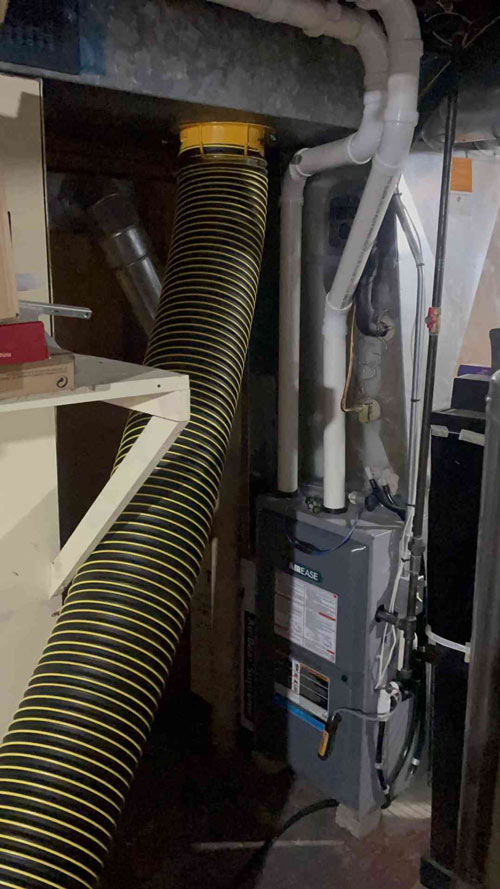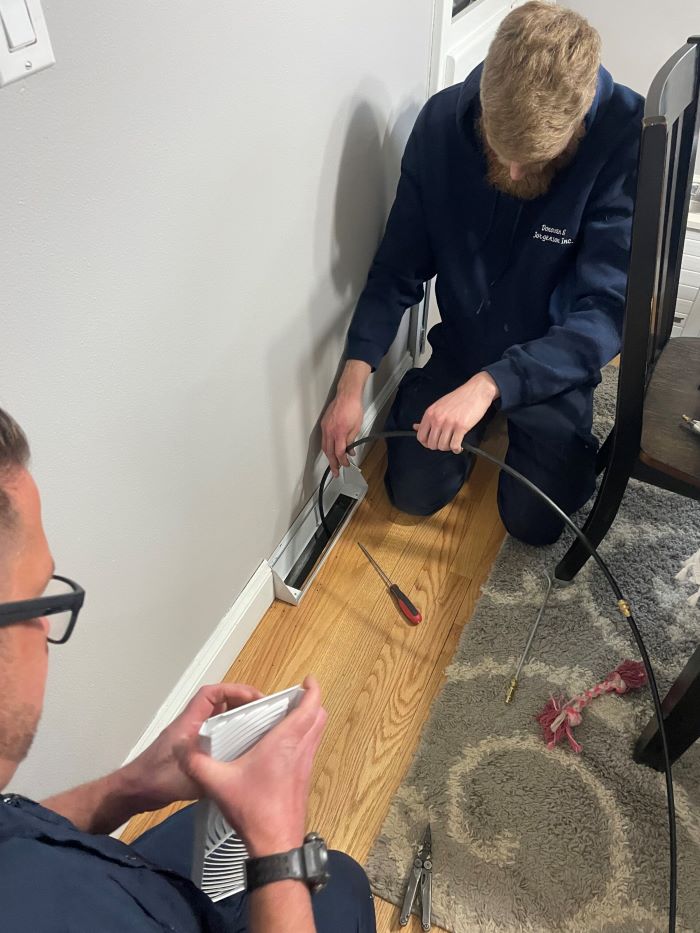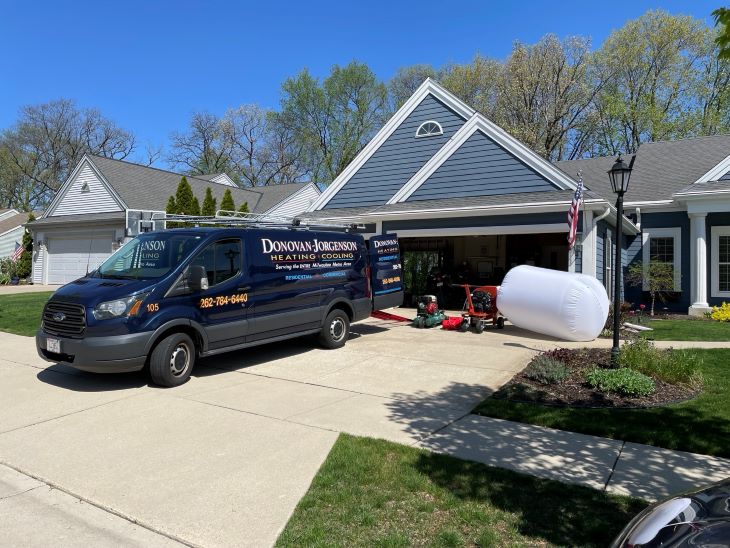Indoor air quality is one of the most crucial factors for creating a healthy and comfortable home environment. While much attention is paid to outdoor air pollution, it’s worth noting that the air you breathe indoors can sometimes be two to five times more polluted than outdoor air, according to the EPA. Learn actionable tips to improve indoor air quality, keep your home free from harmful pollutants, and support a healthier environment for your family.
From simple changes to professional indoor air quality services, get ready to breathe easier at home in Wisconsin.
Why Indoor Air Quality Matters
Understanding why indoor air quality (IAQ) is significant is the first step toward making improvements in your home.
Health Benefits
Poor indoor air quality can aggravate asthma, allergies, and other respiratory issues. Prolonged exposure to pollutants such as mold, pet dander, and volatile organic compounds (VOCs) can even lead to severe health risks such as cardiovascular disease and lung infections. Improving IAQ reduces these risks and promotes better respiratory health, especially among children and the elderly.
Comfort and Productivity
Cleaner air creates a more comfortable living space. Proper indoor air quality improves sleep quality, reduces unpleasant odors, and improves overall energy levels so family members can focus better and feel more at ease.
Protect Your Home and HVAC System
Improving indoor air quality prevents the buildup of dust and debris, protecting your home’s surfaces and HVAC systems from wear and tear. A healthy indoor atmosphere also limits mold growth and reduces damage caused by excessive humidity.
Tips to Improve Indoor Air Quality
1. Invest in Indoor Air Quality Testing
Indoor air quality testing is the most effective way to understand the levels of pollutants in your home. Indoor air quality monitors and professional services can detect harmful elements like VOCs, carbon monoxide, and radon.
If your IAQ is found to be lacking, indoor air quality service providers can perform assessments and offer recommendations.
2. Upgrade or Maintain Your HVAC System
Your HVAC system plays a pivotal role in your home’s air circulation. Regular maintenance, including duct cleaning and frequent filter replacements, makes a huge difference. Check that you’re using HEPA filters, which are highly effective at capturing microns as small as 0.3, including pollen, pet dander, and bacteria.
Professional HVAC inspections can be beneficial in identifying clogged filters, outdated systems, or improper ventilation that may be affecting your home’s IAQ.
3. Maximize Ventilation
Natural ventilation is one of the simplest ways to boost IAQ. Open windows and doors on days when outdoor air quality is good to allow fresh air to flush out pollutants.
For newer or tightly insulated homes, mechanical ventilation systems like energy recovery ventilators (ERVs) are an excellent way to ensure fresh airflow while conserving energy.
4. Use Air Purifiers
Air purifiers equipped with HEPA or activated carbon filters effectively reduce airborne pollutants such as dust, smoke, and chemical odors. Place purifiers in high-traffic areas or rooms where pollutants and allergens are most concentrated.
Additionally, consider installing whole-home air purification systems tied to your HVAC unit for a comprehensive approach to air cleaning.
5. Control Humidity Levels
Mold and mildew thrive in high-humidity environments, significantly impacting IAQ. Use a dehumidifier to maintain indoor humidity between 30–50%. Alternatively, in winter months or drier climates, incorporate a humidifier to prevent overly dry air, which can lead to respiratory discomfort and dry skin.
6. Avoid Synthetic Fragrances and Harsh Chemicals
Many cleaning products, air fresheners, and candles emit VOCs, which reduce air quality. Opt for “green” or “eco-friendly” cleaning products and switch to natural alternatives such as baking soda or vinegar for household cleaning tasks.
7. Keep Your Home Clean
Regular cleaning is simple but necessary. Focus on areas that trap allergens like carpets, bedding, and curtains. Vacuum often using a vacuum with a HEPA filter, and wash bedding weekly in hot water to eliminate dust mites and allergens.
Additionally, avoid accumulating clutter, as it can trap dust and make cleaning less effective.
8. Add Indoor Plants
Certain houseplants, such as snake plants, spider plants, and English ivy, act as natural air purifiers by absorbing toxins and releasing oxygen. While they aren’t a comprehensive solution, they make a great addition to any IAQ strategy.
9. Avoid Smoking Indoors
Tobacco smoke is one of the most harmful indoor pollutants. For the health and safety of everyone in your household, always smoke outdoors and away from open windows or air intakes.
10. Regularly Check Outdoor Air Quality
Outdoor air conditions directly affect indoor IAQ. Use tools like the AirNow app to monitor local air quality index (AQI) scores. On days with good AQI readings, increase natural ventilation; on poor AQI days, keep windows closed and use air purifiers.
Top Indoor Air Quality Products to Consider
For homeowners worried about specific issues like flu season or increased allergens, there are several indoor air quality products designed to make a difference.
- Air Purifiers: Ideal for reducing airborne allergens and viruses.
- Dehumidifiers: Preventing mold by controlling moisture levels.
- Humidifiers: Adding moisture to overly dry environments for better comfort and health.
- Smart Thermostats & IAQ Sensors: Monitor air conditions and adjust HVAC settings with advanced technology.
Professional Services to Improve Indoor Air Quality
Sometimes, DIY methods aren’t enough to address more severe IAQ problems. Professional indoor air quality services in Mukwonago, WI, provide targeted solutions such as duct cleaning, mold removal, and installation of advanced filtration systems. Whether you need a one-time service or ongoing monitoring, experts can customize a plan for you.
Create a Healthier Home Today
Good indoor air quality isn’t just a luxury; it’s a necessity for your family’s health and well-being. By implementing the tips above and considering advanced solutions like indoor air quality testing and professional services, you can create a healthier and safer home.
If you’re in Wisconsin, and ready to take the first step, explore indoor air quality services in your area to find personalized support. Don’t wait to improve the air you breathe every day.
Contact Donovan & Jorgenson Heating and Cooling today to schedule a consultation. Your comfort and well-being are our top priorities!








